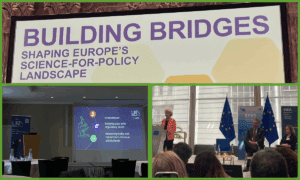The Hungarian presidency follows the Belgian one, as the last of the Spain-Belgium-Hungary trio presidency.
In its programme, the presidency cites “a fragile security situation, illegal migration, the vulnerability of international supply chains, natural disasters, the effects of climate change, and the impact of demographic trends” as key issues to address. In addition, a high emphasis was put on agriculture, likely due to the recent confrontations between governments and farmers.
The initiatives connected to agriculture also relate to research. The presidency emphasizes “BIOEAST“: initiative, which aims to establish an Europe-wide, but Eastern-Europe focused partnership on research and innovation as well as knowledge transfer related to agriculture. According to the presidency, BIOEAST embraces the topics of soil, freshwater, food systems, and biomanufacturing, and prioritises local added value. EuChemS is no stranger to research-policy in agriculture, given its history with science-policy workshops related to the elements of Nitrogen and Phosphorus widely used in farming, as well as its recent invited contribution to a dialogue on interfacing agriculture and science.
BIOEAST is not the sole eastern-europe facing research initiative in the Hungarian presidency’s programme, as one of its stated goals is to “address the fragmentation of the European Research and Innovation Area and to reduce the innovation gap” between east and west, relevant to the “Widening” initiative. The research and innovation section also mentions advanced materials, linked to competitiveness. The programme expresses a preference towards quick research valorisation as well as the use of research and innovation in defence.
While the above research initiatives are ambitious, they are overshadowed by the common conflicts between the Hungarian government and the EU, and the criticism Hungarian PM Viktor Orban faces related to rule of law and security issues. Soon after the beginning of the presidency, Orban claimed to represent the EU at multiple bilateral meetings without previous agreements, which led to High Representative of the Union for Foreign Affairs and Security Policy Joseph Borell’s swift denouncement of the Hungarian PM and the European Commission’s partial boycott toward the Hungarian Presidency, as President of the European Commission Ursula Von der Leyen stated that the “European Commission will be represented at senior civil servant level only” as opposed to by Commissioners, which is the usual approach.



